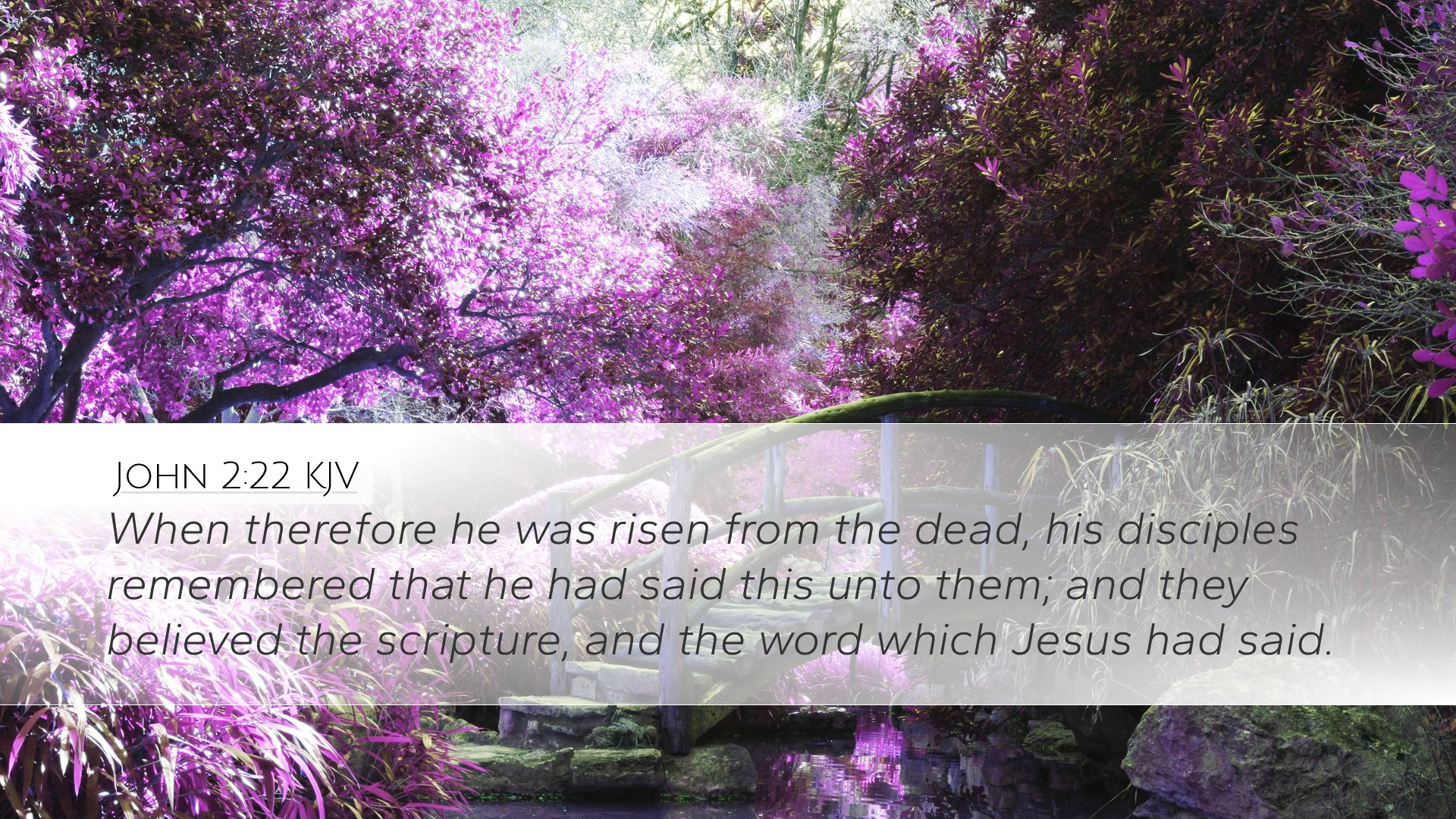Old Testament
Genesis Exodus Leviticus Numbers Deuteronomy Joshua Judges Ruth 1 Samuel 2 Samuel 1 Kings 2 Kings 1 Chronicles 2 Chronicles Ezra Nehemiah Esther Job Psalms Proverbs Ecclesiastes Song of Solomon Isaiah Jeremiah Lamentations Ezekiel Daniel Hosea Joel Amos Obadiah Jonah Micah Nahum Habakkuk Zephaniah Haggai Zechariah MalachiJohn 2:22
John 2:22 KJV
When therefore he was risen from the dead, his disciples remembered that he had said this unto them; and they believed the scripture, and the word which Jesus had said.
John 2:22 Bible Commentary
Commentary on John 2:22
In John 2:22, we find a pivotal moment that encapsulates the essence of Jesus’ ministry and His relationship with the Jewish authorities. The verse reads: "When therefore he was risen from the dead, his disciples remembered that he had said this unto them; and they believed the scripture, and the word which Jesus had said." This commentary seeks to delve into the theological significance, historical context, and practical implications of this verse.
Contextual Analysis
John 2:22 occurs within the narrative following the cleansing of the temple, which serves as a crucial event manifesting Jesus' authority and messianic identity. The context reveals the tension between Jesus and the Jewish leaders, emphasizing the necessity of understanding His more profound message beyond the mere physical temple.
The Resurrection as a Key to Understanding
Matthew Henry comments that the resurrection is a significant moment which allows the disciples to connect Jesus’ earlier statements with the reality of who He is. This moment of remembrance and belief speaks to the nature of faith; it is often in the wake of significant events that believers grasp their importance:
- Recalling Jesus' Prophecy: The disciples recall Jesus’ prediction about His resurrection. This is essential because it transitions their faith from the physical miraculous acts to a profound understanding of His divine role.
- Fulfillment of Scripture: Their belief also connects to the fulfillment of the Scriptures, indicating that faith is founded on God’s promises, which come to fruition through Christ.
Spiritual Implications of the Resurrection
Albert Barnes elaborates on the implications of the resurrection. He asserts that the resurrection is not merely an event but also a theological cornerstone:
- Affirmation of Jesus' Divinity: The resurrection serves as the ultimate affirmation of Jesus' divine authority and God's acceptance of His sacrifice.
- Foundation of Christian Faith: The resurrection becomes the bedrock of Christian belief, marking a transformative moment that assures believers of their future hope in Christ.
The Role of Memory in Faith
Adam Clarke emphasizes the cognitive aspect of faith as evidenced by the disciples’ remembering post-resurrection. The act of remembering is crucial in the faith journey:
- Memory Triggers Faith: The resurrection event triggers a deeper belief, illustrating that faith can be activated by memories of Jesus' words and actions.
- Encouragement in Trials: For believers, recalling Christ's promises and works can serve as a source of encouragement amidst trials and tribulations.
The Relationship Between Faith and Understanding
This verse also highlights the relationship between faith and understanding. As noted by commentators, understanding of Jesus’ mission deepens through the experiences of His life, death, and resurrection:
- Progressive Revelation: The journey of faith is often progressive, where understanding grows through experiences. The disciples’ belief was not instantaneous but developed over time through their relationship with Jesus.
- Importance of Teaching: This underscores the importance of teaching and reminding followers of Christ’s promises to fortify their faith. The act of remembering is vital in nurturing and sustaining belief.
Theological Reflection
The overarching element in John 2:22 is the significant shift from a physical understanding of Jesus to a spiritual one. This transition challenges both the disciples and the readers of the Gospel to consider the deeper meanings of Jesus’ life and mission:
- From Temple to Belief: Jesus' reference to the temple foreshadows a new understanding of worship and presence—Jesus Himself embodies the dwelling of God among humankind.
- Call to Faith: The verse serves as a powerful call to faith, emphasizing that belief must transcend mere sign-seeking and be rooted in the recognition of who Jesus is through divine revelation.
Practical Applications
The insights gleaned from John 2:22 have profound practical applications for pastors, theologians, and believers today:
- Emphasizing Resurrection in Teaching: Pastors should emphasize the centrality of the resurrection in their preaching, as it transforms the understanding of all of Jesus’ teachings and actions.
- Encouraging Reflection: Believers are encouraged to reflect on the words of Christ and how they shape their faith. The act of remembrance can serve as a source of strength in times of doubt.
Conclusion
John 2:22 encapsulates a profound moment in the disciples’ journey of faith, bridging the gap between Jesus' prophetic words and the reality of His divine mission. The resurrection not only affirms Jesus' identity but also stimulates a deeper understanding and belief among His followers. As we engage with this verse, we are reminded of the importance of remembering, understanding, and living out the implications of the resurrection in our lives.


